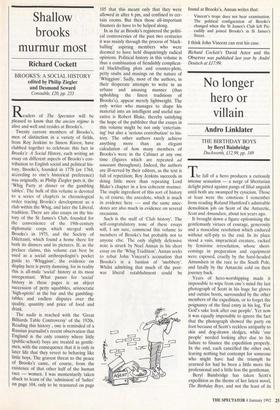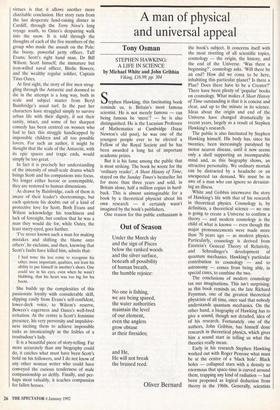No longer hero or villain
Andro Linklater
THE BIRTHDAY BOYS by Beryl Bainbridge Duckworth, £12.99, pp. 189 The fall of a hero produces a curiously intense sensation — a surge of libertarian delight pitted against pangs of filial anguish until both are swamped by cynicism. Those at least were the emotions I remember from reading Roland Huntford's admirable demolition job on Scott of the Antarctic, Scott and Amundsen, about ten years ago.
It brought down a figure epitomising the gentlemanly virtues of courage, generosity and a masculine resolution which endured without self-pity to the end. In its place stood a vain, impractical creature, racked by feminine irresolution, whose short- comings in preparation and equipment were exposed, cruelly by the hard-headed Amundsen in the race to the South Pole, and fatally by the Antarctic cold on their journey back.
Years of hero-worshipping made it impossible to wipe from one's mind the last photograph of Scott in his huge fur gloves and outsize boots, surrounded by the other members of the expedition, or to forget the poignancy of the final entry in his log, 'For God's sake look after our people'. Yet now it was equally impossible to ignore the fact that the photograph showed the party on foot because of Scott's reckless antipathy to skis and dog-drawn sledges, while 'our people' needed looking after due to his failure to finance the expedition properly. In the end, each cancelled the other out, leaving nothing but contempt for someone who might have had the triumph he yearned for had he been a little more the professional and a little less the gentleman.
Beryl Bainbridge has taken Scott's expedition as the theme of her latest novel, The Birthday Boys, and not the least of its virtues is that it allows another more charitable conclusion. Her story runs from the last desperate fund-raising dinner in Cardiff, through the Terra Nova's long voyage south, to Oates's despairing walk into the snow. It is told through the thoughts of each of the five members of the group who made the assault on the Pole: the boozy, powerful petty officer, Taff Evans; Scott's right hand man, Dr Bill Wilson; Scott himself; the immature but iron-willed naval officer, Birdie Bowers; and the wealthy regular soldier, Captain Titus Oates.
At first sight, the story of five men strug- gling through the Antarctic and doomed to die in the attempt is a long way, both in scale and subject matter from Beryl Bainbridge's usual turf. In the past her characters have struggled simply to survive urban life with their dignity, if not their sanity, intact, and some of her sharpest comedy has been centred on women who had to face this struggle handicapped by impossible children and all too possible lovers. For such an author, it might be thought that the scale of the Antarctic, with its epic spaces and tragic ends, would simply be too great.
In fact it is precisely her understanding of the intensity of small-scale drama which brings Scott and his companions into focus. No longer either heroic or contemptible, they are restored to human dimensions.
As drawn by Bainbridge, each of them is aware of their leader's shortcomings, but each quietens his doubts out of a kind of protective love for Scott. Both Evans and Wilson acknowledge his touchiness and lack of foresight, but confess that he was a man they would die for, while Oates, the least starry-eyed, goes further.
`I've never known such a man for making mistakes and shifting the blame onto others', he exclaims, and then, knowing that Scott's faults have killed him, admits that:
I had none the less come to recognise his other, more important, qualities, not least his ability to put himself in another's shoes. One could see in his eyes, even when he wasn't blubbing, that his heart was too big for his boots.
She builds up the complexities of this passionate loyalty with considerable skill, slipping easily from Evans's self-confident, lower-deck voice, to Wilson's reserve, Bowers's eagerness and Oates's well-bred irritation. At the centre is Scott's feminine presence, his very perversity and impulsive- ness inciting them to achieve impossible tasks as intoxicatingly as the foibles of a troubadour's lady.
It is a beautiful piece of story-telling. Far more accurately than any biography could do, it catches what must have been Scott's hold on his followers, and I do not know of any other woman writer who could have conveyed the curious tenderness of male companionship so deftly. Finally, and per- haps most valuably, it teaches compassion for fallen heroes.











































 Previous page
Previous page